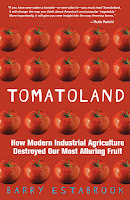 Staff Review by Chris Saliba
Staff Review by Chris SalibaFoodie and former Gourmet magazine writer Brian Estabrook goes to the barricades with this brilliant and horrifying book on industrial tomato production, Tomatoland. While investigating why modern tomatoes are so flavourless (they grow them out of sand in Florida, using fertilisers and pesticides), he gets involved in the workers' movement to help improve the pay and conditions of the mostly Hispanic tomato pickers the industry employs.
The American State of Florida does not provide an environment particularly conducive to growing tomatoes, yet ironically enough it is a major tomato grower. How does this happen? Through the magic of technology and cheap fossil fuel energy inputs. Amazingly, in Florida big business has found a way of successfully growing tomatoes out of, wait for it - sand. Fertilisers are pumped into the ground, and pesticides are sprayed over the top, until perfect tomatoes are grown. The only problem, according to consumer satisfaction surveys, is that the tomatoes are tasteless, hard and very unappetising. These industrial tomatoes are grown for hardy transporting and trade, rather than savouring as a delicious food.
While the subtitle of Tomatoland makes it seem like a foodie’s war against blandness (writer Brian Estabrook was a contributing editor at Gourmet magazine for eight years), the book has perhaps more in common with Upton Sinclair’s classic about worker exploitation in the Chicago meatpacking districts, The Jungle (1906). Estabrook dedicates Tomatoland to the ‘men and women who pick the food we eat’ and devotes much of the book to the plight of the mainly Hispanic workers that pick tomatoes under appalling conditions.
There are some truly heartbreaking stories in this horror movie of industrial tomato production. Poor workers in fear of being deported often work in fields that are sprayed with dangerous pesticides. Not only that, these workers get doused whilst on the job, their clothes dripping wet with toxic chemicals. Estabrook interviews several women who worked under these conditions while pregnant, later giving birth to severely deformed babies. Added to this tragedy is the high cost of medical care for the sick babies.
These exploited workers have courageously managed to organise and agitate for improved conditions. This has not been easy, as the powerful food producing industries fight tooth and nail against even the smallest improvements in workers’ pay and conditions.
The last section of the book describes the possibilites for improved taste, productivity and working conditions on organic farms. Going organic, according to Estabrook, seems to be the answer to most of the problems industrial production creates. Surprisingly there are even productivity gains to be made by going organic.
Despite the grim sounding subject matter of Tomatoland, the book is a surprisingly good read. Estabrook writes in a nice, elegant style and does his homework to bring the story directly from the field and farmer to the reader. There is plenty of first hand journalism, interviews with victims and industry hot shots, plus reporting from rallies and protests. His book paints a frightening picture of industrial food production, both for human health and fairness to workers. Tomatoes forced out of sand by use of fertilisers and pesticides sounds like a recipe for disaster. And if Tomatoland is anything to go by, it is.
Tomatoland: How Modern Industrial Agriculture Destroyed Our Most Alluring Fruit, by Brian Estabrook. Published by Andrews McMeel Publishing. ISBN: 9781449423452 $19.95
Tomatoland: How Modern Industrial Agriculture Destroyed Our Most Alluring Fruit, by Brian Estabrook. Published by Andrews McMeel Publishing. ISBN: 9781449423452 $19.95
No comments:
Post a Comment